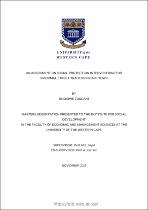| dc.description.abstract | Social protection focuses on defending and assisting those who are weak, marginalized, or facing risks. (Browne, 2015). The unemployed, poor children and women, elderly people, and persons with disabilities, as well as those who are displaced, and ill, are amongst vulnerable groups that can be supported by social protection interventions, (Browne, 2015). These could be covariates affecting communities or regions as a result of climatic changes, inflation, civil unrests, protests, pandemics, epidemics or other pressures and shocks. Although there is a debate over the definition of social protection, most operational definitions include social assistance (which provides protection from poverty) and social insurance (protection against vulnerability). (Deveraux, 2012). Social protection's main goals are managing vulnerability and reducing income poverty. | en_US |

